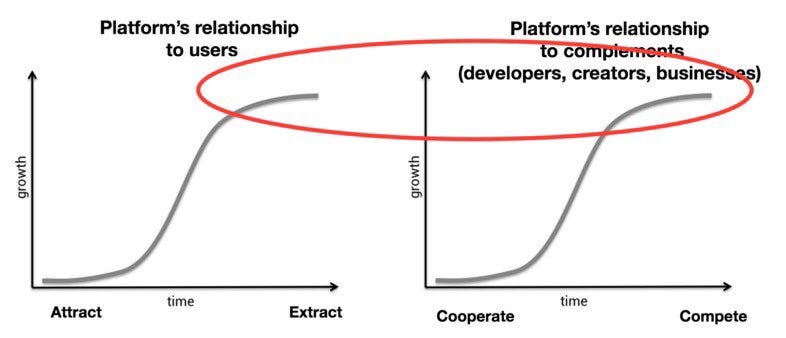web2 has a bad emperor problem
In his book The Origins of Political Order, Francis Fukuyama describes a political dilemma called the bad emperor problem.
Here is the bad emperor problem in a nutshell: emperors are no problem, until you have a bad emperor, then you have a bad problem.
Under a good emperor, there may not be obvious day-to-day differences between living in an empire and a democracy. The trains run on time, the grocery shelves are stocked. You get on with life. Living under a good emperor may even have some advantages. A single locus of authority can simplify planning, and coordinate state capacity.
But a bad emperor is catastrophic. You realize with dawning horror that your life exists at the pleasure of the emperor. No checks, no balances, no exit.
Most of today’s internet is made up of centralized platforms ruled by emperors. Many of them have been pretty good emperors, doing their best to manage platforms well, allowing ordinary people to get on with their lives.
Under a good emperor, there may not be obvious day-to-day differences between a closed, centralized platform (Twitter, Facebook, App Store), and an open, decentralized ecosystem (web, internet). Living under a good emperor may even have some advantages. Vertical integration often makes for smoother, more convenient user experiences, and centralization allows for better curation and control. Anyway, we’re rocketing up the s-curve, so why would the emperor be bad? Growth is up and to the right, everyone is getting rich, the emperor is happy. Win-win.
But the differences start to show when the s-curve saturates. This is where we are with web2. There’s no alpha left in these centralized web2 platforms. Any remaining juice can only be got through a hard squeeze. The relationship to users, creators, businesses turns adversarial.
You realize with dawning horror that your life exists at the pleasure of the emperor. No checks, no balances, no exit.
The old world is dying, and the new world struggles to be born: now is the time of monsters. (Gramsci)
In a sense, this drama around Musk’s Twitter takeover is just a symptom of an aging paradigm. This is what it looks like when web2 empires decay. Capricious bans, reprisals, partisan doxing, targeted TOS changes, false accusations, rule-by-decree. All fair game. Emperors only have to be good when they feel like it.
This document defines "centralization" as the ability of a single entity or a small group of them to exclusively observe, capture, control, or extract rent from the operation or use of an Internet function.
…
The Internet has succeeded in no small part because of its purposeful avoidance of any single controlling entity. Originating in a desire to prevent a single technical failure from having a wide impact, this stance has also enabled the Internet's rapid adoption and broad spread. The Internet can accommodate a spectrum of requirements and is now positioned as a global public good because joining, deploying an application on, or using the Internet does not require permission from or ceding control to another entity.
(Nottingham, 2022. Centralization, Decentralization, and Internet Standards)
I’m picturing an alternate universe where the internet is centralized, and is being taken private for $44bn. The new emperor is reading your SSL connection and doxing it all to his fans.
Decentralized systems make this class of catastrophe impossible, or at least very unlikely. Of course, decentralization introduces many other challenges, but I suspect in trying to solve them, we do our future selves a favor. Over the long view, centralized empires are brittle. One bad emperor can take them down. There’s a reason nature favors decentralization. It’s the decentralized systems that survive.




